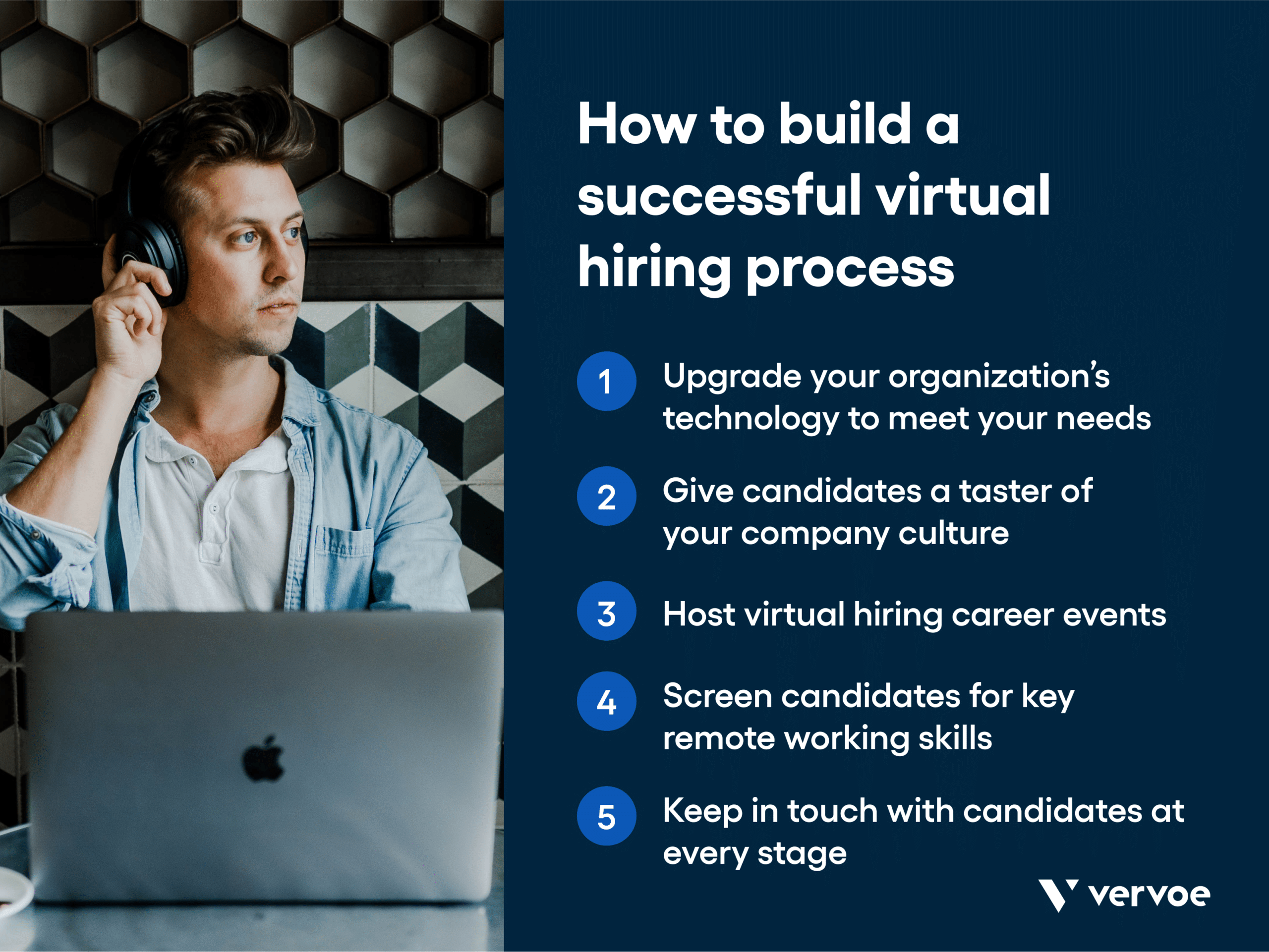If you’re determined to attract and recruit the best talent for your organization, you’ll need to fine-tune your virtual hiring process.
What is virtual hiring?
Virtual hiring refers to any stage of the recruitment process that takes place remotely – replacing any face-to-face interactions between a candidate and their recruiter or hiring manager.
An effective virtual hiring process offers a whole host of benefits. For example, an increased flexibility when it comes to scheduling interviews coupled with the automation of some manual tasks means employers can process more candidates more efficiently. Alongside streamlining the recruitment process, interview costs and travel expenses save money for the employer and the employee respectively. Better planning and increased consistency during the interview process can also serve to reduce hiring biases and improve diversity.
Five steps to building a successful virtual hiring process
Virtual hiring is not without its challenges including reduced personal connections between employers and job candidates and dependence on, potentially expensive, technology.
Nonetheless, both virtual recruitment and remote working are becoming increasingly common. So, if you are committed to securing the best talent that’s out there, you’ll need to level-up on your virtual recruitment processes.
The following five steps can be quickly implemented and have the potential to transform your virtual hiring process overnight.
1. Upgrade your organization’s technology to meet your virtual recruitment needs
Does your organization have the technology in place to support your virtual hiring processes?
In the absence of face-to-face meet-ups, you’ll benefit from good quality video conferencing software for interviewing your candidates. During the earlier stages of the recruitment process, or for pre-screening applicants, this software can also be leveraged for candidates to record and send in videos.
Technology can also be used to automate certain stages of the recruitment process, particularly if you’re receiving a high volume of applications. Chatbots, for example, can significantly reduce your manual task load and quickly process candidates by performing tasks like answering FAQs or scheduling interviews. Meanwhile, AI-powered remote interview software can help you to test candidates’ proficiencies.
Don’t forget to check how any new technologies will integrate with your existing tech stack.
2. Give candidates a taster of your company culture
Virtual hiring means candidates will miss out on the opportunity to snoop around the workplace in person and properly assess a company’s culture. Increasingly, employees care about working for an organization whose values align with their own and where they can be themselves and strike healthy work-life balance.
Once you’ve whittled down your candidates to a final shortlist, it’s well worth investing some time to properly sell the benefits of working for your organization. Some of the ways to create a more in-depth virtual experience include arranging for candidates to meet with existing employees, providing a virtual tour of the office, or educating them about important initiatives your organization is running. This will give them a chance to ask questions, engage more meaningfully, and assess if they are the right fit for your workplace.
3. Host virtual hiring career events
Some employers have extended their use of technology to host virtual recruitments fairs, networking events, seminars, Q&A sessions, and webinars. This is a great way to expand your reach and attract a more diverse range of talent.
While these kinds of events have the benefit of being cheap and easy to host, it’s all too easy to get complacent. You’ll quickly deter prospective candidates if you don’t make an effort to engage and excite them. Events should be concise, well-structured, and fun, involve several employees to add variety to the sessions, and weave in some attendee participation. Be sure to ask for feedback so you can continuously improve events and give prospective candidates the information, experience, and insights they’re looking for.
4. Screen candidates for key remote working skills
If you’re hiring for a remote working position, you’ll need to screen candidates for a unique set of skills.
Fortunately, a virtual hiring process provides the perfect opportunity to assess candidates on their aptitude for remote work. Are they able to communicate concisely, clearly, and comfortably via your organization’s virtual platforms? Are they confident when it comes to using technology?
Candidates will also need to be self-motivated and proactive, organized, independent, results-focussed, and adaptive. To test these skills, you could provide applicants with a scenario-based assignment.
Getting to know candidates personally can also be extremely useful. When communicating via a virtual platform, you’re less likely to deviate from your pre-written interview script to engage in small talk.
To combat this, integrate some more personal topics into your list of interview questions. What are their hobbies and interests? How do they feel about remote working? What is their preferred working style? These sorts of questions will make it easier to assess someone’s suitability for a role at your organization.
5. Keep in touch with candidates at every stage of the virtual hiring journey
If you’re not conscious of carefully nurturing candidates through the virtual hiring process, they could end up feeling isolated. Most importantly, make you keep the communication channels open, provide regular updates, and manage their expectations from the outset.
Candidates should be informed about each stage of the recruitment process, the tools they’ll need, and when they can expect responses from you. This will help to put their minds at ease and give them ample time to adequately prepare. It’s totally fine to automate the communication of some of this information – so long as it reaches the candidate one way or another and they also have the option to reach out with questions as and when they need to.
Remember, a hiring manager’s work is never truly done. You might need to incorporate additional assessments, review your interview questions, or work on injecting a little more of that all-important human touch? By obtaining candidate feedback and analyzing your recruitment successes and failures, you’ll be equipped to continually fine-tune your virtual hiring process.
Vervoe’s remote interview software is designed to help you make great hires that optimize your remote work team. Find out more here.





















